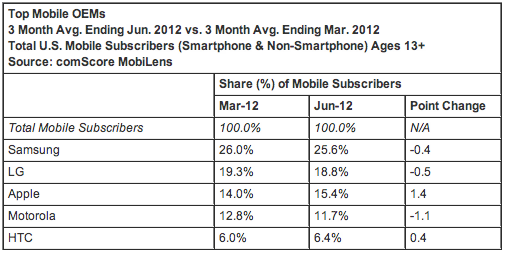comScore: Android still mobile king; Apple's growth spurt

Samsung and Google remain in holy matrimony as the dominant duopoly in the smartphone space. But Apple is growing faster than Android is, and Google could end up suffering a rocky few months.
According to comScore, Google's Android operating system remained on top in June thanks to its partnership with Samsung, which also remains at the top of the smartphone makers' table. But with only weeks before Apple is expected to announce a new iPhone and a couple of months before its release, the Cupertino-based technology giant is outpacing Google.

While last month's figures -- February to May -- showed Samsung was still growing albeit, from the three month average of March to June showed the Korean technology giant declined in share by 0.4 percent, while Apple grew by 1.4 percent; slightly less than last month's figures but nevertheless on the whole a consistent growth pattern.
Samsung now stands at 25.6 percent of the mobile market -- smartphone and non-smartphones -- while Apple's smartphones alone are in at 15.4 percent.
While there's still a large gap between the two rival device makers, Apple is catching up month on month.
Remember, this was even before the release of the Samsung Galaxy S III; next month's figures will be enlightening to see whether or not Apple can ride on its curveball success or if Samsung continues to decline.
HTC marginally grew, while Motorola lost out by more than a whole percentage point.
Compare this to platform, however, and Apple is shown again to outpace every other platform vendor in the mobile space. It saw a rise by 1.7 percent, while Android only managed 0.6 percent.
BlackBerry maker Research in Motion retains its third-place standing, but will likely not see a rival jump up and bite it from the behind. As RIM continues to decline at roughly the same rate month-on-month that Apple rises, RIM's platform will continue to dwindle down until a point where Microsoft will take its place.
Symbian, Nokia's ailing and now deprecated operating system, continued to decline. At least for Nokia, that's likely a good sign.
Samsung's successes next month rely all but entirely on the company's debut of the Galaxy S III -- dubbed the next BYOD buddy for enterprise customers bringing in devices from home -- which recently saw the 10 million sales milestone after just a month. Granted, it was a rough start for the company with slow rollouts and manufacturing problems, but Apple may see only limited gains with a slowdown in iPhone sales in the run-up to the iPhone 5 launch, expected in October, as per its Q3 earnings.
comScore said there are now 234 million U.S. mobile users aged 13 and older with smartphones, up by 4 percent to 110 million since March. This pegs the smartphone penetration figure at more than 47 percent of the overall phone population.
Image credit: comScore.